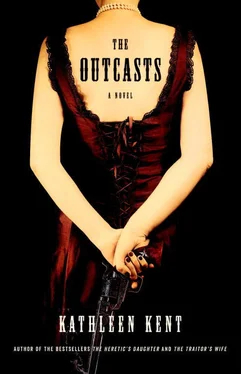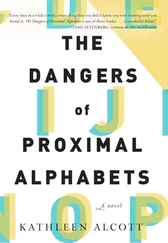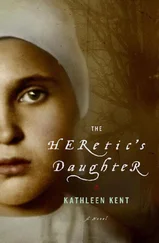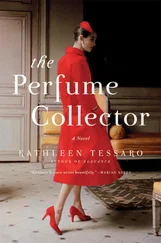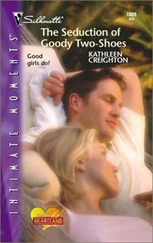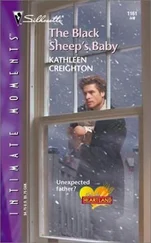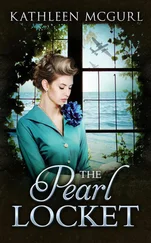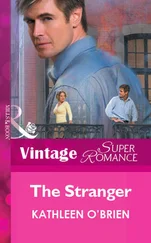But she had to look away from the terrible rawness of the settlers of Middle Bayou as they gazed in pride at their offspring, their thin, ragged hopes for the future, and focus her attention back on Euphrastus’s droning speech. When it ended at last, the farmers clapped politely and, after shyly wishing Lucinda well, walked back into the light, away to their fields and homes.
When she turned to face the children, Lucinda was surprised to see that the Wallers’ son, Elam, was still at the back of the room. Sephronia reappeared at the door uttering apologies, saying she had walked halfway down the path home before she remembered her stranded invalid. She cheerfully waved and then wheeled the chair from the schoolhouse as though she had merely forgotten a tea cart after a party.
In the silence that followed, Lucinda wrote on the slate board balanced on an artists’ easel Miss Carter. She then turned to her students. “Over the course of weeks, you will be practicing reading and mathematics, geometry, in particular. Nothing of nature or in man’s designs for roads or bridges or even surveying can be appreciated without an understanding of the spatial relationships between one thing and another.”
She smiled at their blank, uncomprehending faces and then turned once more to the board. Below her name she wrote, in elaborate looping letters, In one page, describe your greatest hopes and fears.
Having handed out the copybooks, she seated herself in the chair behind the large desk. For the better part of an hour, she watched her charges struggling to put their thoughts into words, brows furrowed, lipping pencil nubs like anxious horses. She occasionally nodded encouragement and answering a few simple questions from the younger children. When the last child had completed the assignment, she collected the books and, to the students’ delight, turned the class loose for the day.
She stood in the door waving good-bye. Experiences with her own teachers had shown her that there were no greater tools with which to control young minds than their weaknesses and their fears.
As the days passed, she learned their names, their habits, and their histories. Several of the students were bright; most gave no trouble. The two oldest boys, fourteen and sixteen, were brothers, and aggressive in their early defiance of her. But after Lucinda complained to Euphrastus, the older, Jack, was severely caned. For a week following the caning, she went out of her way to show excessive kindness to the younger brother, Sam—praising him for his work, ruffling his hair, smiling at him fondly—ensuring that the brothers’ grudges and resentments would be turned towards each other.
At the end of the week, the resulting fistfight in the yard saw both of them expelled entirely from the schoolhouse.
Her cleverest student was Pete. He was no more than nine or ten but had the eyes of an old man. He had a bad stutter, but she found that if she stood behind him with her hand placed firmly on his shoulder, he could speak reasonably well. Those who teased him for it were given the onerous task of cording wood for the schoolhouse stove or liming the outhouse.
She let the majority of the students pursue their own interests and spent the most time with those few inclined to mathematics. In this regard, May was bright, but easily bored, often wandering away without permission or explanation.
At the end of the second week, on a rainy afternoon, May lingered after the other students had left. She was bent over her workbook, her face close to the page, completing the last of the day’s assignments: an essay on the legends of Middle Bayou. Lucinda in that instant realized that May was quite shortsighted. It made the girl seem vulnerable, and Lucinda was surprised to feel suddenly protective, knowing that the otherwise perfect girl had such a flaw. She asked, “Are you near finished?”
May looked up, stretching her neck. “I could go on and on.”
Lucinda reached out her hand for the return of the book and smiled warmly. “I’m certain you could.”
May shut her copybook and returned it to Lucinda. She sat on one corner of the desk, swinging her feet, the hem of her dove-gray dress hiked above her knees.
Lucinda asked, “Another new dress, May?”
May pursed her lips. “It was La-va-da’s.”
Lucinda laughed at the near-perfect imitation of Lavada’s drawl. “That was kind of her.”
“Kind had nothing to do with it. Her mother was going to pitch it in the rag barrel.” May leaned back on her elbows. “It kills her that it looks so fine on me.”
Lucinda reached out and slowly pulled the hem of the dress down over May’s knees. May arched her brows and laughed. “Do you have a gentleman friend, Miss Carter?”
Lucinda shook her head.
“I only ask because I saw that you’d gotten a letter.” May pointed to a pocket in Lucinda’s dress.
A cautioning reflex held Lucinda’s expression in check. A letter had been delivered to her the day before, and she had kept it hidden in her clothing, reading it only when she thought she was alone. “Why would you think it from a gentleman?”
May shrugged. “Receiving mail in Middle Bayou is as eventful as the slaughtering of the autumn hog.” She smiled, a sly curving of the mouth. “I saw the writing on the envelope.”
“As it happens, it’s from my brother.”
May looked disappointed at the news but asked, “Is he handsome?”
“Yes, I think so.”
She shifted onto her side, lying full out on the desk as though it were a couch, her head propped up on one hand. “Mr. McKenzie, our neighbor, is handsome, or would be if he wasn’t frowning all the time. He has only one arm, you know, from the war, and his place has been reduced to a few pitiful acres, though he had thousands in Georgia. I think I should let him kiss me if he had two arms. What must it be like, do you think, to be kissed by a one-armed man…”
“May.” Jane stood in the open doorway. She saw her sister reclining on the desk and frowned. “I’ve been calling and calling.” She held out a hand.
Diffuse sunlight from a breach in the clouds haloed around Jane’s face and hair as she stood in the doorway, and Lucinda thought that she was actually pretty. Then May came to stand next to her, and the impression was diminished.
Jane asked, “Miss Carter, would you please have supper with us tomorrow at six? My father has yet to meet you.”
May circled one arm tightly around her sister’s waist and added, “And we have a piano, so afterwards I can sing for you.”
Lucinda tried to imagine a piano within the forlorn walls of the Grant home; her most recent sampling of such entertainment had been inside a bordello, the songs explicit and, for the less knowing, instructive. Any opportunity to avoid the lackluster talk at her employer’s dinner table, though, would be welcome. She inclined her head in acceptance and, gathering up the copybooks to read in her room, said good night to the sisters.
After closing the schoolhouse door, she walked down the path to the Waller settlement. A short distance away, she stopped and slipped inside an old greenhouse. It had been used only for storage by the family but, as some of the glass was broken, nothing of value had been placed inside, and the door was never locked. Lucinda had taken to hiding in it occasionally, to write and read her letters unobserved. Her room in the Waller house was sometimes unexpectedly invaded by Lavada or Lavada’s mother wanting to engage her in conversation, and the little shed was the only place that gave her the quiet that she craved; a counterweight to the years spent with no privacy, no solitude, no peace.
She sat on an old piece of burlap and took the missive out of her pocket. The distinctive writing on the envelope, its letters controlled and angular, was decidedly mannish, but May’s observations had disconcerted her. The letter inquired about her progress in the settlement; it was cordial enough, and yet a note of impatience was already in evidence.
Читать дальше
